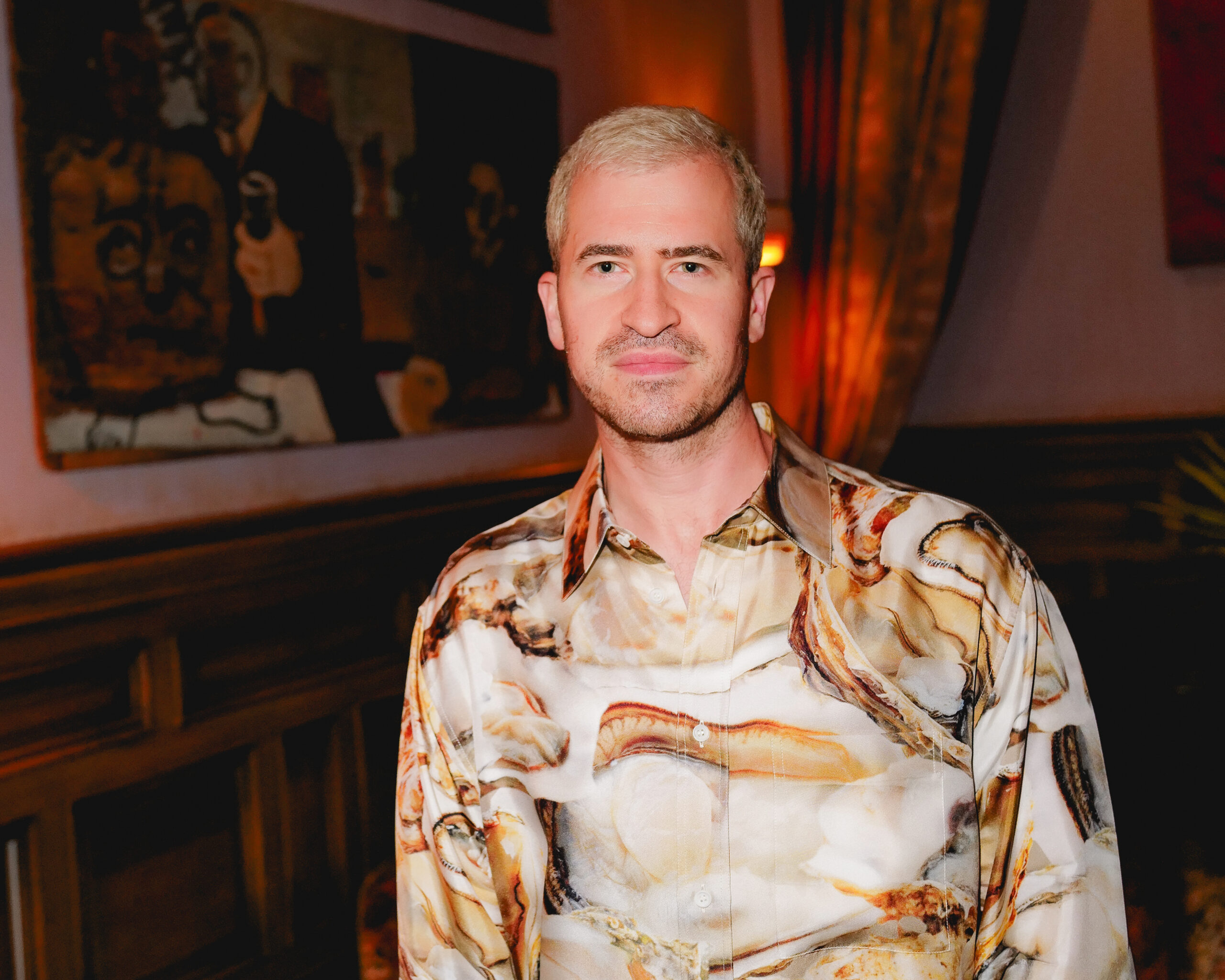There’s a moment in every celebrity interview when the publicist’s time warning signals the end of a carefully managed conversation. That is, unless you’re Evan Ross Katz, whose ability to turn Hollywood’s most guarded personalities into willing conspirators in dishing tea has earned him both Mike White’s designation as “the most valuable hype man” and a spot on The Washington Post’s “Post Next 50” list. While traditional entertainment media scrambles to decode what makes content go viral, Katz has organically constructed something far more coveted: a corner of the internet that feels neither like homework nor media Mensa, but more like the group chat you never want to leave.
Track any major pop culture moment back to its source these days, and you’ll likely find Katz’s digital fingerprints all over it. When Jennifer Coolidge evolved from beloved character actress to full-blown cultural phenomenon, he’d already been documenting her brilliance for years (and fittingly showed up to her latest Halloween party dressed as White Gladis, the notorious yacht-tipping orca). Before Ariana Grande and Cynthia Erivo’s “holding space” exchange (complete with that now-iconic finger moment) from the Wicked press junket broke the internet, it was Katz who first spotted the magic. His passionate championing of Sarah Michelle Gellar was once written off as niche nostalgia—until Hulu announced a Buffy reboot earlier this year, proving his cultural Spidey senses were right all along.

The Pittsburgh native didn’t exactly follow a predictable media playbook. Long before he understood pop culture could be a career, it was his obsession—a sandbox where he developed the critical eye that would later define his work. When he arrived in New York, he followed the conventional path at first: cutting his teeth at Huffington Post’s Queer Voices before accumulating bylines in Paper and The Cut, among others.
At the same time, Katz was pioneering something far more potent on Instagram. His meticulously curated screen grabs—capturing the split-second facial expressions, awkward pauses and unscripted moments from TV shows, red carpet interviews and press junkets—turned fleeting cultural moments into shareable artifacts with lasting impact. “I’m always taking the temperature of what people are saying on social media,” he tells Observer, explaining his evolution from journalist to what he now calls “cultural commentary”—a distinction that acknowledges how thoroughly he’s rewritten the rules of entertainment reporting. “It’s less about reading traditional coverage and more about hearing that real-time conversation. The intellectual component comes from not trying to be influenced by what others are saying or doing and trying to keep track of my North Star.”
That instinct has turned Katz into something of an oracle. When a new show drops—scratch that, even when the trailer drops—his exquisitely timed screen grabs and razor-sharp captions initiate the seedlings of discourse. Even A-listers, drawn to his mix of industry knowledge and unabashed fandom, slide into his DMs to trade gossip. It’s the kind of access that can’t be bought with a PR budget. “I think people long for the days of water-cooler moments in entertainment,” he says, diagnosing our collective hunger for shared cultural touchpoints. “That’s often what plays out in my post comments—a collective moment to celebrate or commiserate. I’m just giving people a slice of the best bits in a pithy, meme-friendly way.” It’s this ability to bridge insider access with communal nostalgia that makes his content so addictive—digital water-cooler talk for an era that desperately misses it.
His expanding media footprint now includes an HBO collaboration (hosting an official White Lotus retrospective podcast), co-hosting podcast Drop Your Buffs with reality TV fan Sean Ross, and his own Substack newsletter, Shut Up Evan. The latter, in particular, provides the Goldilocks way to circulate his brand of cultural dissection. “Podcasting is tougher than it seems—at least for me,” he admits. “I’m not a stream-of-consciousness person. I love the immediacy and candidness when I’m listening, but when I’m putting out my own ideas, a newsletter lets me really parse through a topic. Plus, an editor can catch incomplete thoughts or show me where to dig deeper.”

In an industry obsessed with strategy, Katz’s success stems from a refreshingly analog approach: pure instinct. “I try to spend as little time as possible thinking about what I do or how I do it, and really focus on just doing,” he says. “Sometimes I vibrate, and other times I don’t. That’s my ultimate barometer.” This intuition manifests in a feed that seamlessly pivots from Democratic National Convention memes to thirst posts about Jonathan Bailey’s thighs without missing a beat. “People don’t get whiplash because that’s just how I operate,” he explains, noting how his audience has come to expect—and embrace—this blend of politics, fashion and pop culture commentary. “You can’t talk about the world we live in without occasionally dipping into bigger issues. My audience expects me to show up when it matters, just like I do for the fun stuff.”
For those emulating a similar trajectory, Katz offers refreshingly blunt advice: “Pick what you love and commit. I always say if Sarah Michelle Gellar, my number one, so much as goes grocery shopping, I’m on the beat. I show up for what resonates with me, and I do it meticulously.” In other words, forget the hot take factory and start a conversation others actually want to join. One smartly placed meme, Katz shows, can spark the kind of thoughtful dialogue we’ve all been craving—and if that’s not living in the best of both worlds, he’s not sure what is.
<
